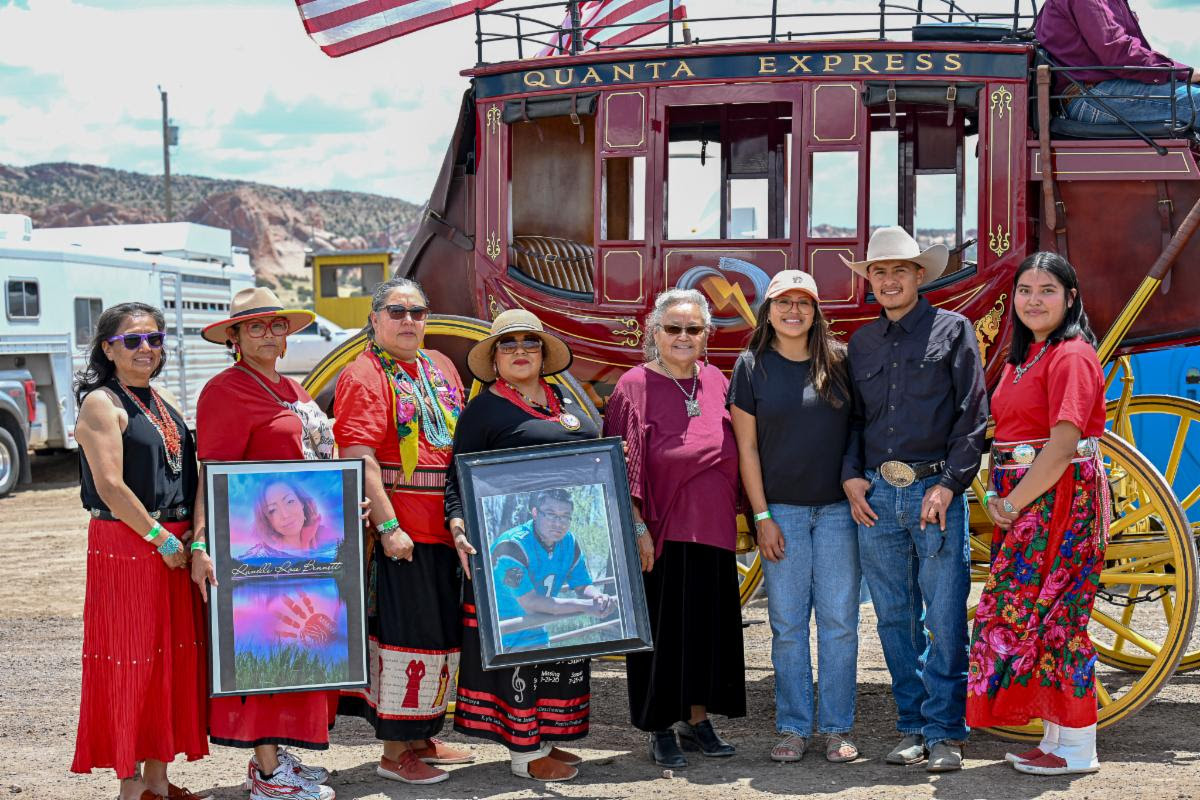
- Details
- By Native News Online Staff
On Sunday, during the final day of the Professional Rodeo Cowboys Association (PRCA) event at the Dean C. Jackson Memorial Arena in Window Rock, a moving recognition ceremony was held to honor families of missing and murdered Diné relatives.
Families of Donnie Wade Barney, Zachariah Juwaun Shorty, Duane Thomas, Latisha Candice Desiderio, and Ranelle Bennett were honored as they were escorted through the rodeo grounds in a ceremonial carriage. Supporters dressed in red — a color symbolizing remembrance and unity — surrounded the procession, carrying signs with the names and faces of their loved ones. The ceremony transformed grief into collective action, drawing attention to a crisis that continues to impact Diné communities across the Navajo Nation.
Council Delegate Amber Kanazbah Crotty, Chair of the Missing and Murdered Diné Relatives (MMDR) Task Force, was instrumental in organizing the event in collaboration with the Navajo Division of Health (NDOH) and PRCA Rodeo organizers. Delegate Crotty extended heartfelt thanks to both the PRCA and NDOH for their efforts in bringing visibility to the urgent issue of missing and murdered Indigenous people.
“The MMDR Task Force was invited to help bring this recognition to life and to call attention to the crisis of missing Indigenous people,” said Delegate Crotty. “This event gave families a platform to share their stories and spread awareness. Their strength is what keeps this movement alive.”
Each family’s story was shared during the ceremony, honoring their strength and unwavering pursuit of justice. The families of missing loved ones have never stopped calling for answers and accountability. Vangie Shorty, mother of Zachariah Juwaun Shorty, has become a powerful advocate—not only seeking justice for her son, but also raising her voice for countless others facing similar heartbreak.
Throughout the recognition, rodeo participants, community members, and leaders stood in unity with the families. Speaker Crystalyne Curley and Council Delegate Amber Kanazbah Crotty walked alongside them, reaffirming the 25th Navajo Nation Council’s commitment to seeking justice and supporting healing for Diné families impacted by this ongoing crisis.
“The 25th Navajo Nation Council established the Missing and Murdered Diné Relatives Task Force to respond to this crisis in collaboration with families and advocates,” said Speaker Curley. “The Council’s commitment is not symbolic—it’s structural. We are building long-term solutions with the people most impacted.”
The MMDR Task Force assists with these cases, supports families, and leads community-based prevention efforts. The Task Force is finalizing its Tribal Community Response Plan—a strategy focused on equipping rural communities with tools for response, prevention, and healing.
The recognition event was not a moment of closure—it was a moment of truth, declaring that the lives of missing and murdered Diné relatives matter, and their stories will not be forgotten. The call to action is clear: stand with these families and demand justice for missing Diné relatives.
More Stories Like This
Native News Weekly (August 25, 2024): D.C. BriefsUS Presidents in Their Own Words Concerning American Indians
NDAA passes House; Lumbee Fairness Act Advances
NFL, Vikings to Host Native All-American Game, Youth Flag Clinic
Senate Committee on Indian Affairs Passes 12 Bills to Strengthen Tribal Communities
Help us defend tribal sovereignty.
At Native News Online, our mission is rooted in telling the stories that strengthen sovereignty and uplift Indigenous voices — not just at year’s end, but every single day.
Because of your generosity last year, we were able to keep our reporters on the ground in tribal communities, at national gatherings and in the halls of Congress — covering the issues that matter most to Indian Country: sovereignty, culture, education, health and economic opportunity.
That support sustained us through a tough year in 2025. Now, as we look to the year ahead, we need your help right now to ensure warrior journalism remains strong — reporting that defends tribal sovereignty, amplifies Native truth, and holds power accountable.
 The stakes couldn't be higher. Your support keeps Native voices heard, Native stories told and Native sovereignty defended.
The stakes couldn't be higher. Your support keeps Native voices heard, Native stories told and Native sovereignty defended.
Stand with Warrior Journalism today.
Levi Rickert (Potawatomi), Editor & Publisher


